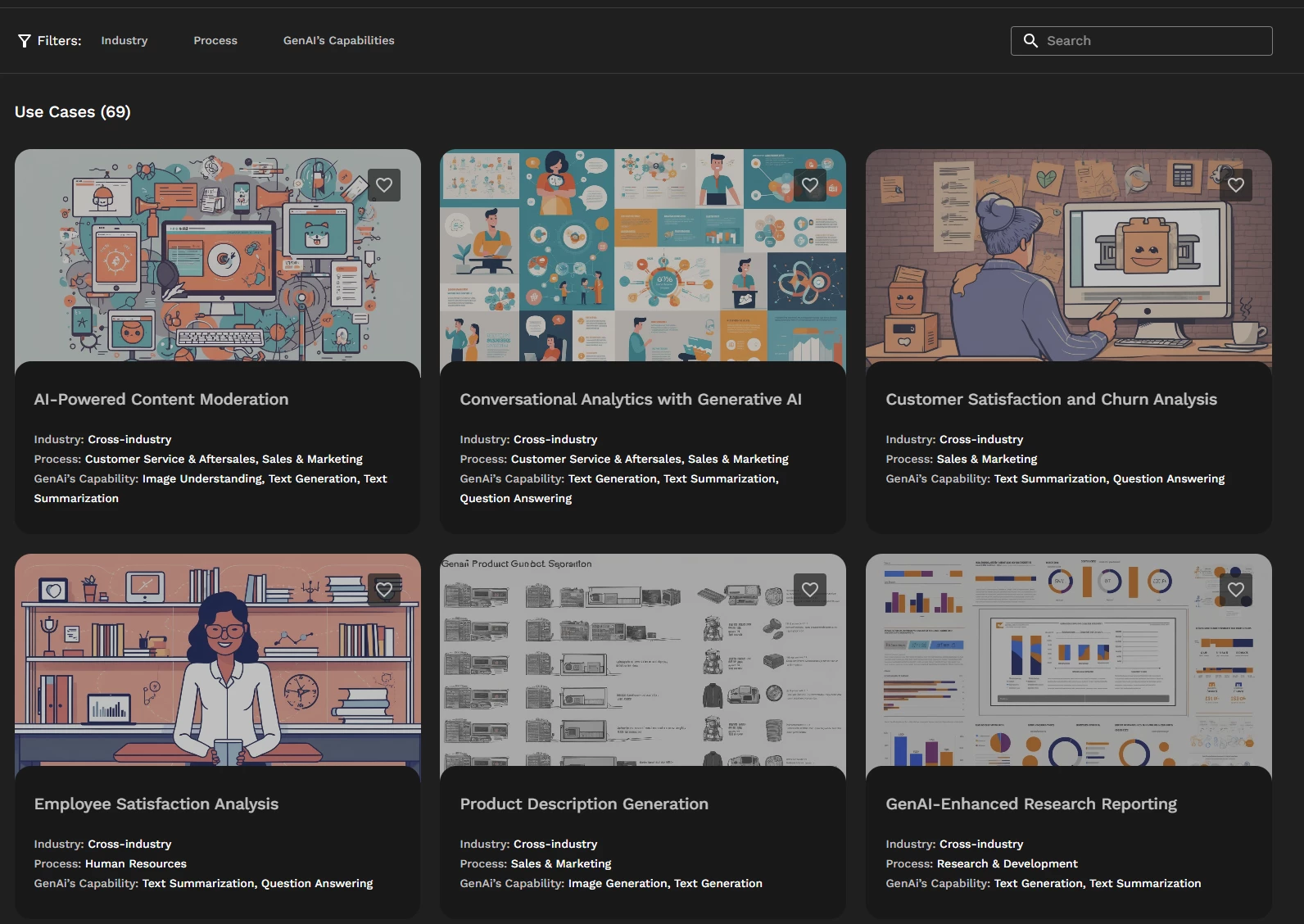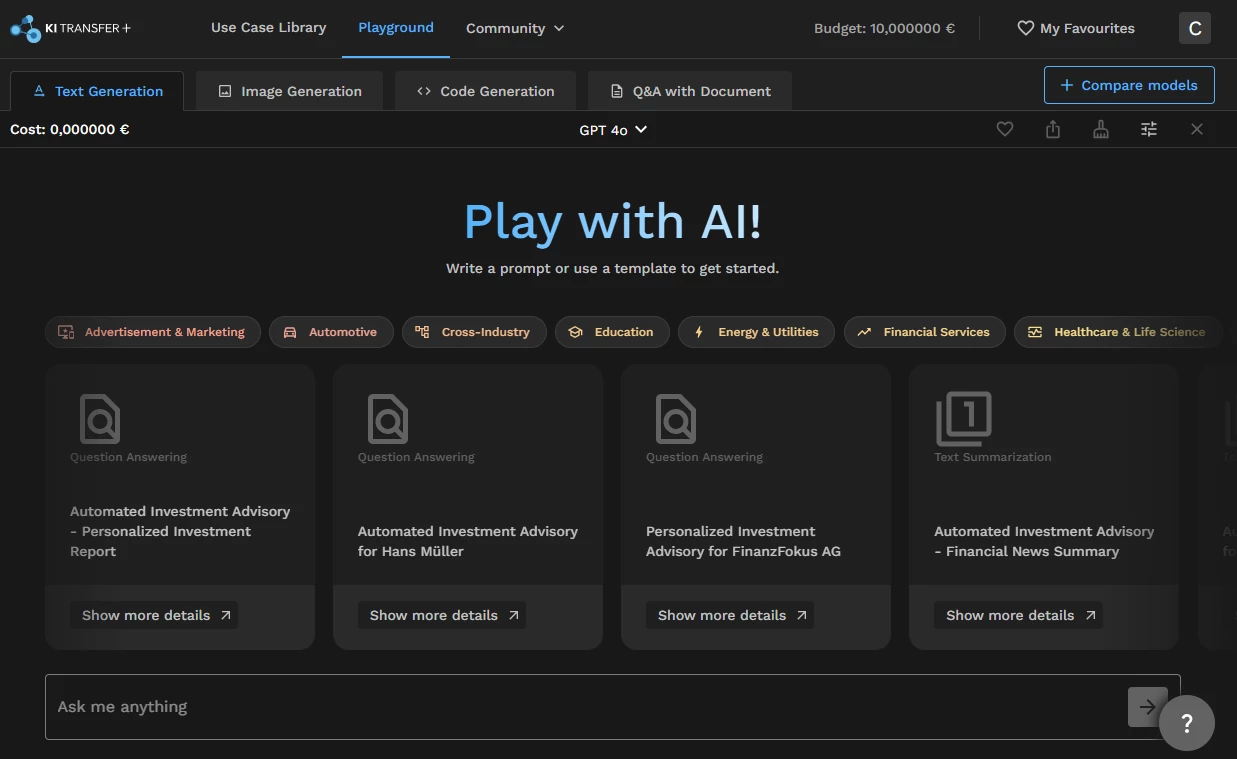Generative AI is transforming industries by offering tools to enhance customer engagement, streamline operations, and create innovative products and services. However, adopting these advanced technologies can be challenging for small and medium-sized enterprises (SMEs). To bridge this gap, appliedAI has developed the GenAIxy platform, an exclusive resource available only to participants of the KI Transfer Plus program.
The Challenge: Why SMEs need GenAIxy
Generative AI technologies, like OpenAI’s ChatGPT or Stable Diffusion, offer transformative potential across industries. These tools can automate repetitive tasks, enhance decision-making, and even unlock entirely new business opportunities. However, for SMEs, leveraging these technologies often comes with significant challenges:
- Lack of Expertise: SMEs often lack the in-house AI expertise to experiment with or implement generative AI tools effectively.
- Resource Limitations: Unlike large corporations, SMEs have limited budgets and personnel to dedicate to exploratory technologies.
- Unclear Use Cases: Identifying specific generative AI use cases that fit into business processes requires both creativity and technical understanding.
- Missing Single Point of Entry: Many SMEs need a platform that combines hands-on tools, terminology definitions, and up-to-date industry insights.
The GenAIxy platform was created to tackle these issues directly, offering a safe and supportive space for SMEs to experiment, learn, and gain confidence in applying Generative AI for SMEs to their unique challenges.
GenAIxy: A Strategic Tool for KI Transfer Plus Participants
As part of the KI Transfer Plus program, GenAIxy provides a tailored approach to generative AI adoption. Funded by the Bavarian Digital Ministry, KI Transfer Plus equips SMEs with the tools, skills, and resources to navigate the complexities of artificial intelligence. GenAIxy plays a vital role in this mission, offering features like the Use Case Library, AI prompt templates, and a Knowledge Hub to guide SMEs on their AI journey.
The Four Core Pillars of GenAIxy
Use Case Library: From Ideas to Implementation
The Use Case Library is a curated collection of best practices and templates showcasing successful generative AI applications across industries. These resources help SMEs identify relevant AI use cases and implement them efficiently.
Examples include:
- Customer Support Automation: Streamlining responses to common inquiries using AI-powered chatbots.
- Marketing Content Generation: Producing high-quality product descriptions, blogs, and social media content.
- Data Analysis and Reporting: Automating the extraction of insights from large datasets.
Each template is designed to simplify adoption, enabling SMEs to focus on outcomes while bypassing technical complexities. Businesses leveraging these resources achieve measurable improvements in efficiency and innovation.

Use Case Prompt Templates: Making AI Accessible
GenAIxy goes beyond inspiring users by providing actionable tools for implementation. Each use case is paired with AI prompt templates designed for business applications. These templates guide non-technical users in testing and interacting with generative AI models.
For example:
- Learn how to craft prompts for generating marketing content or analyzing datasets.
- Test templates for automating customer support or optimizing supply chains.
This hands-on approach empowers business users to understand AI capabilities and their direct impact on operations.
Playground Types: Experimentation at your Fingertips
The GenAI Playground offers SMEs a chance to explore AI tools categorized by their capabilities and modalities. The playground features include:
- Text Generation Playgrounds: Experiment with models like ChatGPT for automating content creation.
- Image Generation Playgrounds: Leverage tools like Stable Diffusion for branding and design.
- Code Generation Playgrounds: Assist developers with code snippets or debugging.
- Document QA Playgrounds: Test AI capabilities for answering questions from uploaded documents.
Each playground includes benchmarking tools that allow SMEs to compare models, assess performance, and identify the most suitable generative AI tools for their needs. SMEs can explore generative AI capabilities confidently, with access to prebuilt AI prompt templates to streamline experimentation.

Knowledge Hub: Building AI Literacy
Long-term success with generative AI requires more than tools—it needs understanding. The AI Knowledge Hub within GenAIxy serves as an educational repository, offering foundational and advanced resources for SMEs:
- AI Terminology Explained: Definitions of concepts such as neural networks and multimodal AI.
- Guides and Tutorials: Step-by-step instructions for using generative AI tools effectively.
- Industry News: Updates on trends, research, and applications in the AI space.
This focus on education ensures that SMEs not only implement AI solutions but also develop the literacy needed to harness AI’s full potential.

Model Comparison: Intuitive Decision-Making
The Model Comparison Tool, another key feature of the GenAIxy platform, empowers SMEs to evaluate generative AI models based on performance, cost, and applicability. This tool is invaluable for businesses deciding whether to build in-house solutions, purchase off-the-shelf tools, or use open-source models.
For instance, SMEs exploring multilingual AI can test models like Teuken-7B, which offers unique advantages for European businesses.

The GenAIxy platform’s Model Comparison Tool simplifies AI decision-making for SMEs, helping them evaluate and choose between open-source and commercial models. This data-driven tool supports informed “make-or-buy” decisions, ensuring businesses select the model that best meets their needs.
To make learning and exploration intuitive, the platform offers a hands-on playground divided into four main areas, focusing on key AI capabilities: text generation, image generation, code generation, and interacting with the SME’s own documents and data.
A standout feature is the integration of innovations like Teuken-7B, an open-source model developed under Germany’s government-funded OpenGPT-X program. Created by the Fraunhofer Institute for Intelligent Analysis and Information Systems, Teuken-7B exemplifies Europe’s commitment to fostering open-source AI tailored to regional needs.
Teuken-7B: A Multilingual Open-Source AI Model for European Businesses
Teuken-7B, developed under the OpenGPT-X project, is a game-changer for SMEs and researchers in Europe. Unlike English-centric models like LLaMA, Teuken-7B is trained on all 24 official European languages, with 50% of its data focusing on non-English content. This makes it uniquely equipped to address the multilingual needs of European businesses.
Why Teuken-7B Stands Out for SMEs
For SMEs exploring the potential of generative AI through GenAIxy, Teuken-7B as an Open source model, trained only based on European standards and European data, it offers several key advantages:
- Transparency and Control: As an open-source model, Teuken-7B allows businesses to customize it while keeping sensitive data secure and compliant with strict EU regulations.
- Cost Savings: Its efficient design reduces energy consumption and processing costs, even when working with diverse languages.
- Proven Performance: Teuken-7B excels in multilingual benchmarks, demonstrating capabilities on par with commercial alternatives across various tasks.
For SMEs exploring generative AI, Teuken-7B offers a reliable, cost-effective solution tailored to Europe’s unique linguistic and regulatory landscape.
Real Results with GenAIxy
Through the GenAIxy platform, SMEs can transform curiosity into practical applications. For example, a retail business participating in KI Transfer Plus automated product descriptions, leading to:
- A 50% reduction in time spent on content creation.
- Enhanced consistency in marketing materials.
- Increased confidence to explore additional AI use cases, such as customer support automation.
